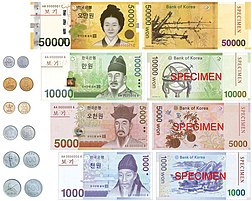South Korean Won
| South Korean won | |
|---|---|
| 대한민국 원 (Korean) | |

Coins and banknotes of the South Korean won.
|
|
| ISO 4217 | |
| Code | KRW |
| Number | 410 |
| Exponent | 0 |
| Denominations | |
| Subunit | |
| 1⁄100 | jeon (전/錢) Theoretical (not used) |
| Plural | The language(s) of this currency does not have a morphological plural distinction. |
| Symbol | ₩ |
| Banknotes | ₩1,000, ₩5,000, ₩10,000, ₩50,000 |
| Coins | ₩10, ₩50, ₩100, ₩500 |
| Demographics | |
| User(s) |
|
| Issuance | |
| Central bank | Bank of Korea |
| Website | eng |
| Printer | Korea Minting and Security Printing Corporation |
| Website | english |
| Mint | Korea Minting and Security Printing Corporation |
| Website | english |
| Valuation | |
| Inflation | 1.3% (Feb 2016, Year-on-Year % Change) |
| Source | [6], February 2016 |
| South Korean won | |
| Hangul | 대한민국 원 |
|---|---|
| Hanja | 大韓民國 圓 |
| Revised Romanization | Daehanmin(-)guk won |
| McCune–Reischauer | Taehanmin'guk wŏn |
The won (/wʌn/;Korean: 원, Korean pronunciation: [wʌn]; symbol: ₩; code: KRW) or the Korean Republic Won is the currency of South Korea. A single won is divided into 100 jeon, the monetary subunit. The jeon is no longer used for everyday transactions, and appears only in foreign exchange rates. The won is issued by the Bank of Korea, based in the capital city, Seoul. The official currency of North Korea, issued by the Central Bank of the Democratic People's Republic of Korea which is based in its capital city, Pyongyang, is divided into the same number of units, and is known as the North Korean won.
The old "won" was a cognate of the Chinese yuan and Japanese yen. It is derived from the hanja (원), meaning "currency" or "coin." The won was subdivided into 100 jeon (Hangul: 전; Hanja: 錢; RR: jeon; MR: chŏn), itself a cognate of the Chinese character (qián) which means "money" and also used as a unit of money in ancient times. The current won (1962 to present) is typically written in hangul only.
...
Wikipedia
